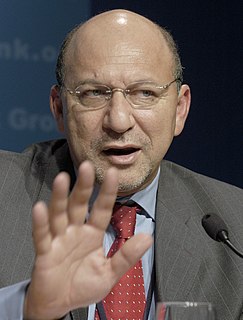Top 32 Multinationals Quotes & Sayings
Explore popular Multinationals quotes.
Last updated on November 15, 2024.
Terrorism [is] a biological consequence of the multinationals, just as a day of fever is the reasonable price of an effective vaccine . . . The conflict is between great powers, not between demons and heroes. Unhappily, therefore, is the nation that finds the "heroes" underfoot, especially if they still think in religious terms and involve the population in their bloody ascent to an uninhabited paradise.
My experience to date has been that change, particularly relative to business, rarely happens in a revolutionary way. That isn't to say there are not times when major change happens, but my experience is that particularly when you're encouraging businesses to change of their own volition, the change is more slow over time. I don't think global trade is going to go away. I think it's unlikely that global trade and multinationals are not going to be around.
To speak of ‘limits to growth’ under a capitalistic market economy is as meaningless as to speak of limits of warfare under a warrior society. The moral pieties, that are voiced today by many well-meaning environmentalists, are as naive as the moral pieties of multinationals are manipulative. Capitalism can no more be ‘persuaded’ to limit growth than a human being can be ‘persuaded’ to stop breathing. Attempts to ‘green’ capitalism, to make it ‘ecological’, are doomed by the very nature of the system as a system of endless growth.
In 1791, the right to bear arms to defend against an over-reaching government wasn't theoretical. Today, it's hard to imagine physical weapons serving the same purpose. But it's easy to see how hacktivists might - especially if you broaden the opponents to include hate groups and rapacious multinationals.
The great multinationals are unwilling to face the moral and economic contradictions of their own behavior - producing in low-wage dictatorships and selling to high-wage democracies. Indeed, the striking quality about global enterprises is how easily free-market capitalism puts aside its supposed values in order to do business. The conditions of human freedom do not matter to them so long as the market demand is robust. The absence of freedom, if anything, lends order and efficiency to their operations.
One of the weaknesses of Indian industry is that in many areas.. like consumer goods.. it is very fragmented. Individually, the companies might not be able to survive. What is needed is a consortium of like companies in one industry, presenting a strong front to the multinationals. The Swiss watch industry did this.
The religious rightwingism is directly linked to globalization and to privatization. When India is talking about selling its entire power sector to foreign multinationals, when the political climate gets too hot and uncomfortable, the government will immediately start saying, should we build a Hindu temple on the site of the Babri mosque? Everyone will go baying off in that direction. It's a game.




























